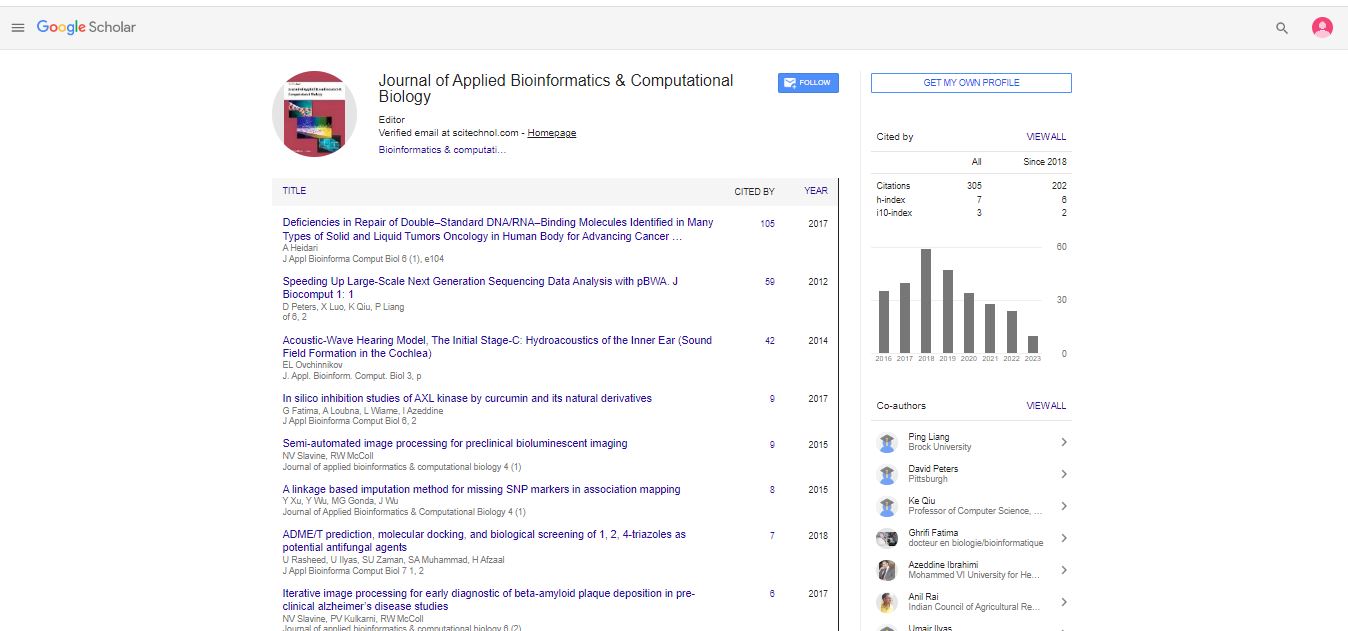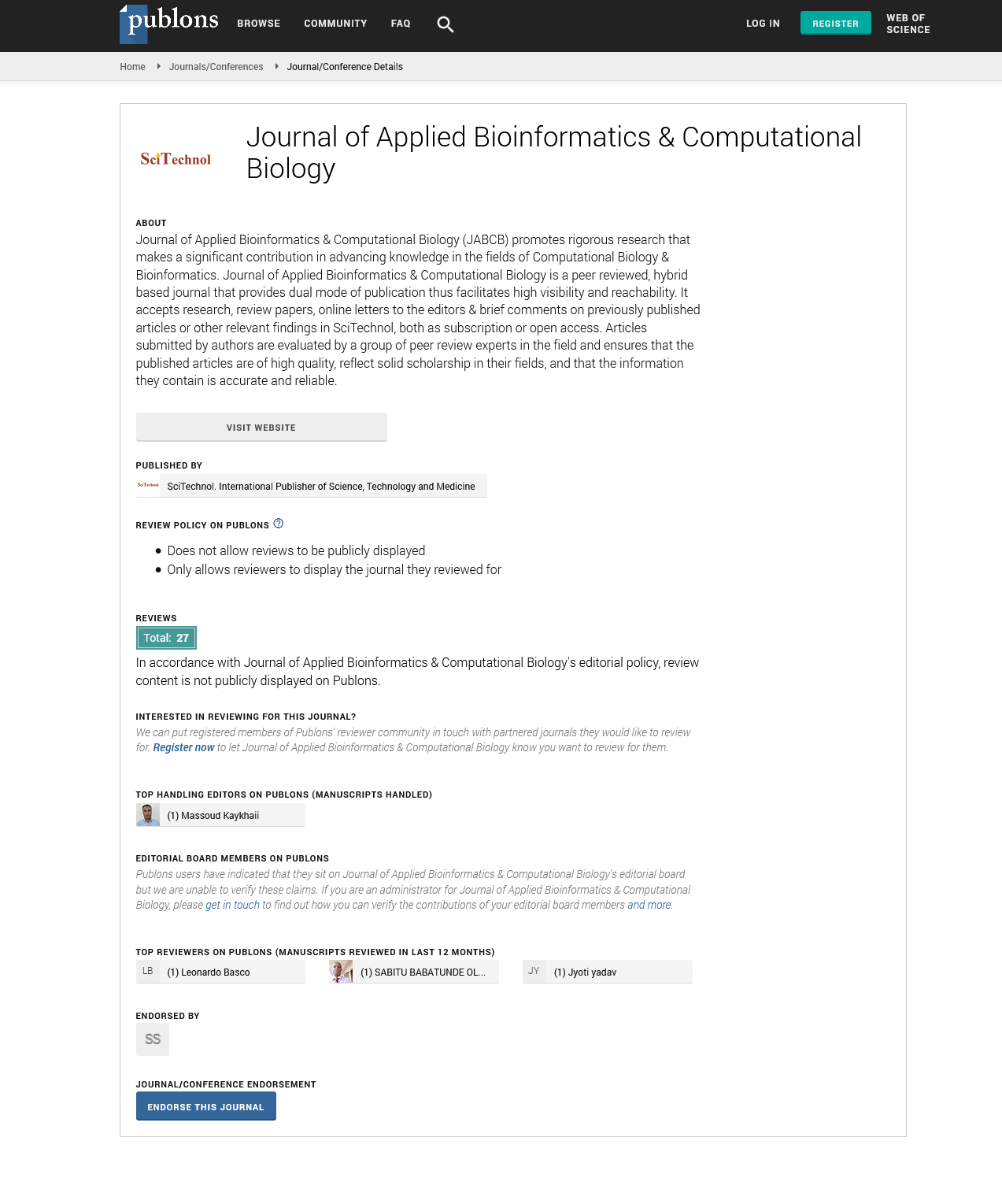Commentary, Vol: 12 Issue: 4
The Role of Big Data Analytics in Modern Medical Diagnostics
Yvan Devaux*
1Department of Biomedical Engineering, Manipal Institute of Technology, Karnataka, India
*Corresponding Author: Yvan Devaux,
Department of Biomedical Engineering,
Manipal Institute of Technology, Karnataka, India
E-mail: Devaux@cfsa.net.cn
Received date: 31 July, 2023, Manuscript No. JABCB-23-114568;
Editor assigned date: 02 August, 2023, PreQC No. JABCB-23-114568 (PQ);
Reviewed date: 16 August, 2023, QC No. JABCB-23-114568;
Revised date: 23 August, 2023, Manuscript No. JABCB-23-114568 (R);
Published date: 30 August, 2023, DOI: 10.4172/2327-4360.1000275
Citation: Devaux Y (2023) The Role of Big Data Analytics in Modern Medical Diagnostics. J Appl Bioinforma Comput Biol 12:4.
Description
The advancing world of healthcare, the integration of technology has directed in a new era of medical diagnostics. Among the numerous technological innovations, big data analytics has emerged as a transformative force in modern medicine. Big data analytics involves the collection, processing, and analysis of vast amounts of data to extract meaningful insights. In the context of healthcare, it has proven to be invaluable in enhancing medical diagnostics, allowing for more accurate and personalized patient care. This essay explores the pivotal role of big data analytics in modern medical diagnostics and its farreaching implications for the future of healthcare.
The healthcare industry has historically been data-rich but information-poor. With the advent of Electronic Health Records (EHRs), wearable devices, and interconnected healthcare systems, the volume of health-related data generated on a daily basis has skyrocketed. This deluge of data includes clinical records, imaging data, genetic information, patient demographics, and more. Harnessing this wealth of information for medical diagnostics and decisionmaking has become a monumental challenge. Big data analytics, gives the tools and strategies to reveal the hidden possibilities inside this huge data. One of the most significant contributions of big data analytics to modern medical diagnostics is its ability to enhance disease prediction and early detection.
Machine learning algorithms, when applied to large datasets, can identify subtle patterns and correlations that human experts might overlook. For instance, predictive models can analyze a patient's medical history, lifestyle factors, and genetic predispositions to assess their risk of developing specific diseases, such as diabetes or cardiovascular conditions. By identifying at-risk individuals early on, healthcare providers can intervene proactively, potentially preventing the progression of the disease and improving patient outcomes. Big data analytics also plays a pivotal role in the advancement of personalized medicine. Every patient is unique, and their response to treatments can vary significantly. By analyzing vast datasets containing information on patient genetics, treatment outcomes, and demographic factors, healthcare providers can tailor treatments to individual patients.
This approach, known as precision medicine, minimizes trial-anderror in treatment selection and dosing, leading to better therapeutic outcomes and reduced side effects. Another area where big data analytics has made substantial inroads is medical imaging and diagnostics. Advanced imaging techniques, such as MRI and CT scans, generate enormous amounts of data, making it challenging for radiologists to process and interpret them accurately. Machine learning algorithms trained on extensive image datasets can assist radiologists by identifying abnormalities, tumors, or other anomalies in medical images. This not only improves the speed and accuracy of diagnoses but also helps in identifying conditions at an earlier stage when they are more treatable.
Beyond the direct impact on medical diagnostics, big data analytics also improves the overall efficiency of healthcare operations. Predictive analytics can be employed to optimize hospital resource allocation, staff scheduling, and inventory management. This results in reduced wait times, better resource utilization, and cost savings, ultimately benefiting patients and healthcare providers alike. While the potential of big data analytics in modern medical diagnostics is undeniable, it comes with its share of challenges and ethical considerations. Data privacy and security are paramount, as healthcare data is highly sensitive and must be protected against breaches. Additionally, the quality and reliability of data can vary, potentially introducing bias into algorithms and impacting diagnostic accuracy.
Furthermore, the ethical use of patient data, transparency in decision-making processes, and informed consent are essential to maintaining patient trust in the healthcare system. Big data analytics has revolutionized modern medical diagnostics, offering new possibilities for disease prediction, personalized medicine, and improved patient outcomes. By harnessing the power of large and diverse healthcare datasets, healthcare providers can make more accurate diagnoses, optimize treatments, and enhance overall patient care. While there are challenges and ethical considerations to address, the potential benefits of big data analytics in healthcare are immense. As technology continues to advance and our understanding of data deepens, the role of big data analytics in modern medical diagnostics will only become more significant, towards for a healthier and more personalized future of healthcare.
 Spanish
Spanish  Chinese
Chinese  Russian
Russian  German
German  French
French  Japanese
Japanese  Portuguese
Portuguese  Hindi
Hindi 
